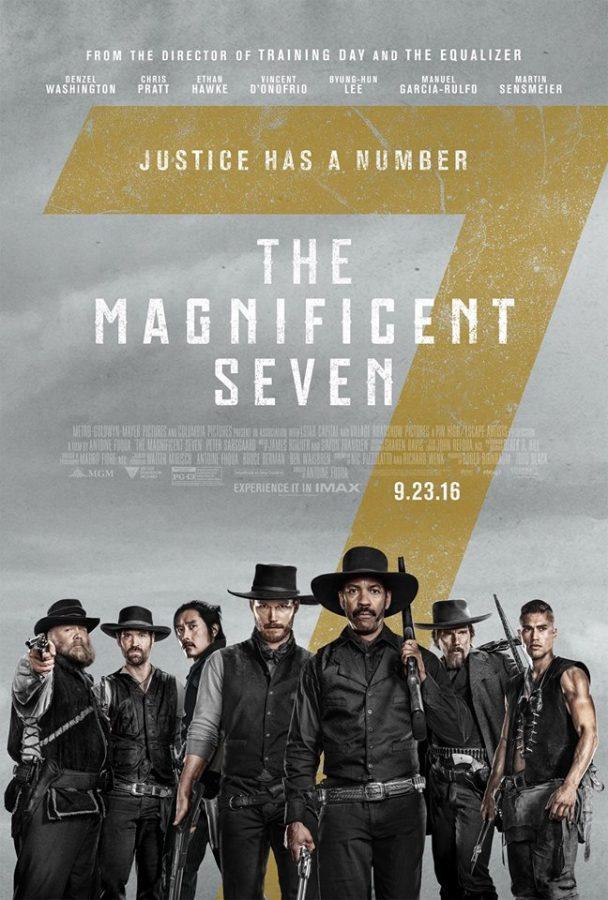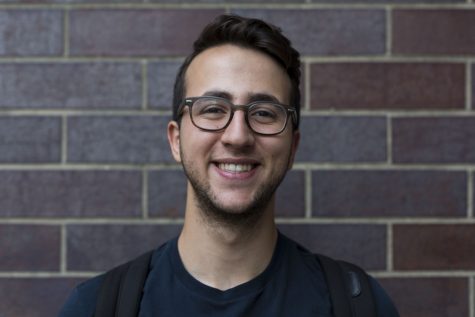‘Magnificent Seven’ Provides Entertainment at the Cost of Morality
Antoine Fuqua’s latest film “The Magnificent Seven,” a remake of the 1960s film of the same name, brings back a high-profile version of the Western genre to modern cinema.
September 21, 2016
Whenever a high-profile western is released — like Antoine Fuqua’s latest film “The Magnificent Seven” — it reignites a debate as to whether the long-dormant genre will come back to life. With Fuqua’s iteration there is little need for such excitement, as its cheap thrills are akin more to a summer blockbuster than the fantastical, often-brutal obsessions of the “Wild West” that used to dominate film.
A remake of the 1960 classic by the same name — which is itself a remake of Akira Kurosawa’s epic “Seven Samurai” (1954) — the film alters the original story slightly: a small mining town is terrorized by wannabe-tycoon Bartholomew Bogue (Peter Sarsgaard), rather than a group of bandits. Bogue’s mercenary army storms the town in the beginning of the film, gunning down a few civilians to send a message: sell your land for cheap, or die fighting for it. Townswoman Emma Cullen (Haley Bennett) chooses the latter, recruiting the help of bounty hunter Sam Chisolm (Denzel Washington), who rounds up six more hired guns to take back the town and fortify it for battle.
The film’s contemporary updates are obvious when looking at the eponymous seven: Washington as the bounty hunter, Lee Byung-Hun as an assassin, Manuel Garcia-Rulfo as an outlaw and Martin Sensmeier as a Comanche warrior create a mixed racial palette never before seen in the historically whitewashed Western genre. Digging a little deeper, there’s a clear parallel to the current political climate, with Sarsgaard’s vehement and violent industrialist reference to the business practices of a certain orange Republican.
Yet such modernity remains purely on the surface, as the film finds little to do with much of its mixed cast. Byung-Hun and Garcia-Rulfo have no character development or exposition other than being violent and, ah, more violent. Sensmeier’s Native American character is especially unsettling, as he’s shoved to the sidelines with almost no dialogue, which is meant to indicate a threatening demeanor but instead shows lazy filmmaking. Bennett is a sore spot as well, whose great emotional fervor gives the film its initial momentum; yet she utterly disappears at the halfway point, seemingly as if women have no place in what’s ultimately a man’s world.
Despite these drawbacks — and an at-times putrid script from somber “True Detective” writer Nic Pizzolatto — the cast shines based on its pure talent. Washington leads with his usual mix of gravitas and fear-inducing swagger, Sarsgaard’s depiction of corruption appears sickly and consuming, Chris Pratt’s comedic wit and action hero bravado rarely fail and the rest of the seven heroes, including Ethan Hawke and Vincent D’Onofrio, bring a jocular, joyous attitude that’s a pleasure to watch.
Fuqua has long been obsessed with violence in his career, most famously with his dark portrait of the LAPD in “Training Day” (2001), yet with “Seven” he presents bloodshed in a remarkably confused manner. Initially death comes hard, fast and in gratuitous fashion, making for morally grey (if not black) heroes. D’Onofrio’s bearish and brutal performance is a particular point of fascination, providing comedy and horror as a confused, rambling tracker who seems to relish in violence. Come the final battle, hundreds die in classic blockbuster fashion: with excitement and little actual blood or dedication to the deceased. While this brainless gore is entertaining, it’s sickeningly hollow, more fit for the throwaway summer months of mind numbing, cinematic explosions.
“Magnificent Seven” will be released in theaters on Sept. 23.
Email Ethan Sapienza at [email protected].

























































































































































